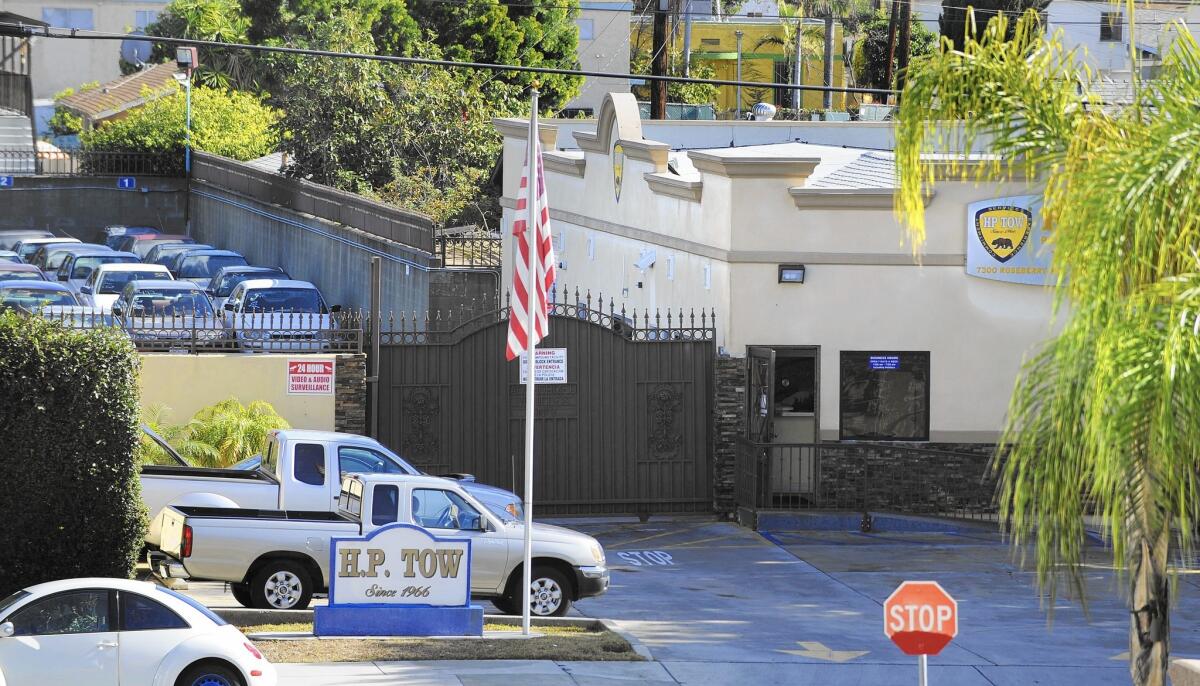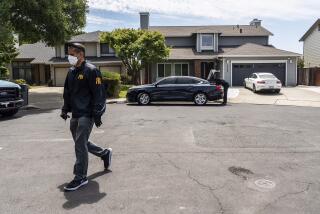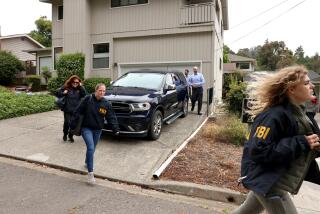Informant in FBI bribery case was Huntington Park councilman

Nearly three hours into a meeting of the Huntington Park City Council, the discussion turned to tow trucks.
The owners of a company that towed and stored impounded vehicles for the city Police Department wanted permission to hike the fees they charged. The police chief and mayor supported the idea, saying the request was reasonable.
But Councilman Valentin Amezquita wasn’t buying it.
In exchange for the monopoly the city had handed H.P. Tow in the form of an exclusive, long-term contract, the company should be offering discounted prices, not asking for more money, Amezquita said.
“What do we get out of this? What do our residents get?” he asked before voting against the higher fees. Two others joined him, defeating the measure.
Join the conversation on Facebook >>
The next day, Amezquita’s phone rang with a call from a lobbyist working with Jimmy Sandhu and Sukhbir Singh, the owners of H.P. Tow. She asked him to lunch.
It was just the move FBI agents had hoped the men would make. When Amezquita sat down with Singh and the lobbyist at a restaurant days later, he was wired with recording equipment that secretly captured the conversation. Federal agents hid nearby.
The August 2013 encounter was the first of several meals, phone calls and tow yard meetings with Singh and Sandhu that Amezquita recorded as an informant for the FBI and which now are at the center of a federal bribery case against the men, court records show. Since their arrest and an initial court appearance in October 2015, Singh, 39, and Sandhu, 37, have been free on bond and have not been formally indicted by a grand jury on criminal charges.
Details of the conversations among the men are contained in an affidavit written by the lead FBI agent in the investigation. In it, the agent does not name Amezquita. The Times identified him as the informant through City Council voting records.
The case has brought a taint of scandal to Huntington Park, making it the latest in the cluster of small, industrial cities south of Los Angeles to be touched by allegations of corruption and political shenanigans.
Most recently in 2012, city leaders in neighboring Cudahy were charged with accepting bribes in exchange for allowing a marijuana dispensary to open, court documents show. And, in 2010, elected officials and administrators in the city of Bell drew national attention for dramatically and illegally inflating their salaries.
Officials in Compton, Lynwood, and several other of the area’s cities also have been charged with or convicted of crimes such as election fraud and public corruption since 2000.
Poor civic engagement by residents and political volatility are the norm in the heavily immigrant, mostly Latino cities, where frequent, intensely contested elections are decided by a small fraction of voters. Amid the turmoil, special interests such as trash haulers or tow truck operators have seized on opportunities to sway votes in their favor.
“It’s an environment that invites corrupt politics — no one is watching. There is a feeling that there is no accountability from inside or outside,” said Tom Hogen-Esch, a professor of political science at Cal-State Northridge, who has studied the group of cities.
The FBI first turned its attention on Singh and Sandhu in 2013, according to an affidavit filed in court by the lead FBI agent in the investigation. It is unclear how agents became aware of the men’s alleged efforts to sway Amezquita.
NEWSLETTER: Get essential California headlines delivered daily >>
Amezquita declined to comment about the case, but said in a statement to The Times that he “takes very seriously his oath of office, the rule of law and public trust.”
Singh and his attorney could not be reached. An attorney for Sandhu, as well as officials from the FBI and the U.S. Attorney’s office, declined to comment.
For decades, H.P. Tow, registered officially as H.P. Automotive and Tow Service Inc., has contracted with Huntington Park, city officials said. Singh and Sandhu have owned the company since 2001, the affidavit showed. They also have contracts to tow and store cars for several surrounding cities as well as the California Highway Patrol and the L.A. County Sheriff’s Department, according to the company’s website.
Such city contracts traditionally have been coveted by tow companies as they often provide a steady flow of business and allow tow companies to charge the city and car owners an array of fees, including the daily storage fees while owners try to get their vehicles released from police custody.
In recent years, however, tow operators have been squeezed by local and state laws that restrict when police can impound cars driven by unlicensed drivers. The new regulations, which were enacted primarily to ease hardships experienced by immigrants living in the country illegally, have undercut significantly the number of vehicles impounded by police.
About a month after the first lunch meeting, Amezquita met with Singh and Sandhu at their tow yard, according to court documents. They complained about sluggish business and their contract with the city that forbid them from raising rates on their own.
More importantly, they told the councilman that if he helped them, they could return the favor, prosecutors say.
“If you have any debts after the election, we can help you to take care of that,” Singh allegedly said at a recorded meeting between the three men at the tow yard, referring to the official’s reelection campaign.
To avoid raising suspicion, Singh and Sandhu said, they would raise money from friends, according to the FBI agent’s affidavit.
“This way it doesn’t look like you are doing a favor for H.P. Tow, you know, so it will keep us out of the loop,” Singh is quoted as saying.
At another rendezvous, Sandhu allegedly complained to the councilman about a controversial state law aimed at assisting immigrants in the country illegally that tightly restricts when police officers can impound the cars of unlicensed drivers. Singh later urged the councilman on multiple occasions to pressure the police chief to be more aggressive in impounding vehicles, saying the department was too lax, the FBI agent’s affidavit states.
Throughout it all, the councilman played the part of a willing conspirator. He once called Singh to express concern that if he reversed his position on the fee hike, residents would object and raise questions. The affidavit alleges that Singh coached the councilman, telling him he should say publicly he did not have enough information about the proposed fee increase at the time of the first vote.
The first payments came in November 2013 at a restaurant in Bell Gardens, when Singh handed the councilman four checks in a white envelope with “H.P. Tow, Inc.” printed on it, according to the affidavit.
A $150 check came from an account belonging to Sandhu, one for $300 was from Singh and the others were from unnamed donors, the agent said in the affidavit.
In all, FBI agents allege the men eventually gave the councilman checks totaling $2,650, although banks refused to cash a few checks totaling $800 for various reasons, including one that bounced. Whenever the councilman received checks from the men he cashed them with the FBI agent, who then took the cash into evidence.
Singh claimed to have been in contact with the city’s other elected officials, telling the councilman a few weeks before the council voted on the price hike that he had spoken with each of the five members and all were “on board,” according to the affidavit.
Ultimately, in January 2014, the council approved the higher fees with two other council members who had previously opposed the motion supporting it. Amezquita was absent from the meeting.
Then, in January last year, the councilman arranged to have lunch with an elected official from Lynwood, another small city a few miles away that also contracts with H.P. Tow, to discuss fundraising plans.
The Lynwood official told the councilman he would introduce him to someone who might be willing to donate. That person turned out to be Sandhu, who showed up to lunch with the Lynwood official, according to the affidavit.
“We helped you before, and we can help you again,” the councilman recalled Sandhu saying.
Twitter: @LATvives
Twitter: @joelrubin
Hoy: Léa esta historia en español
ALSO
Will Inglewood score big with the NFL’s return?
California winner will have to share $1.5-billion Powerball jackpot
How one student asked the state to tackle a looming education question
More to Read
Sign up for Essential California
The most important California stories and recommendations in your inbox every morning.
You may occasionally receive promotional content from the Los Angeles Times.












